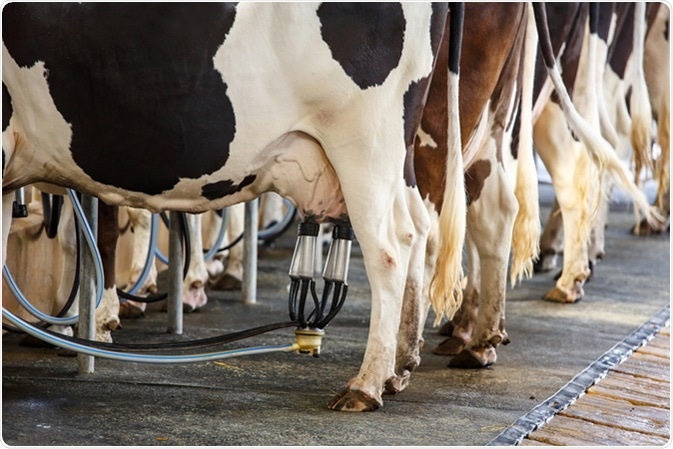Cow’s milk is made up of different components such as milk sugar, proteins (casein and whey), and fat. Because of this, it is highly possible to develop allergies from the formula. Research findings show that 1 out of 50 infants are allergic to cow’s milk; however, the condition is usually outgrown by age three to five years.
Allergic reactions to cow’s milk develop when the body’s immune system mistakes the protein components in cow’s milk as a threat. These protein components are naturally harmless. When the immune system rejects the protein from cow’s milk, it releases chemicals, such as histamines, that trigger allergic reactions.

Image Credit: Ratthaphong Ekariyasap / Shutterstock
Differentiating Between Cow’s Milk Allergy and Lactose Intolerance
Cow’s milk allergy is oftentimes confused with lactose intolerance. However, allergic reactions to cow’s milk and lactose intolerance are two different medical conditions brought about by different triggers. As previously mentioned, cow’s milk allergy develops when the immune system rejects the protein component of the milk formula. On the other hand, lactose intolerance is triggered when the digestive system cannot fully digest milk sugar because of insufficient lactose enzymes.
Cow’s Milk Protein Allergy in Infants - Dr. Aliza Solomon
Age is also a determining factor in differentiating the two conditions. Cow’s milk allergy is common among infants, but rarely occurs after age three. Meanwhile, lactose intolerance is more common and develops among older children, usually following another medical condition such as gastroenteritis.
In some cases, throat discomfort and abnormal mucus consistency is also associated with cow’s milk allergies. However, research suggests that such a condition is brought about by the viscosity of the milk product, and that such discomfort also occurs when other liquids of similar consistency are ingested.
Categorizing Cow’s Milk Allergies
Allergic reactions from cow’s milk could occur at different times following exposure:
- Rapid onset reactions occur within 15 minutes to 2 hours after cow’s milk ingestion or exposure. Allergy tests for cow’s milk are usually positive.
- Delayed reactionsoccur 2 to 8 hours after consumption or exposure to cow’s milk. This type of reaction is uncommon. Allergy tests for cow’s milk usually come out negative.
- Very delayed reactions occur 1 to 3 days after exposure to cow’s milk. This condition is very uncommon. Allergy tests for cow’s milk almost always come out negative.
Different types of allergic reaction may be diagnosed based on the speed of onset. As such, cow’s milk allergy may be classified into two types, based on the symptomatology: IgE-mediated and non-IgE-mediated.
IgE-mediated milk allergies occur within a few hours after exposure to digestion. Rapid onset reactions and delayed reactions fall under this category. Non-IgE-mediated milk allergies, on the other hand, occur many hours or even a few days after the milk product is consumed. Very delayed reactions fall under this category.
Signs and Symptoms of Cow’s Milk Allergy
Symptoms of cow’s milk allergy are dependent on the rate of onset of the condition. In an IgE-mediated allergy, symptoms would usually include:
- Skin reactions
- Abdominal pain
- Nausea or vomiting
- Diarrhea
- Fever
- Wheezing
- Breathing problems
- Anaphylaxis (for severe cases)
in contrast, non-IgE-mediated allergies would show the following symptoms:
- Skin reactions (usually eczema)
- Reflux
- Unusual stool
- Constipation
- Abdominal pain
- Breathing problems
Both forms of allergies require immediate medical attention and treatment. Caregivers are usually asked to monitor the infant’s symptoms and their relation to cow’s milk intake for a week or two after the onset of the allergic reaction.
Further Reading
Last Updated: Oct 12, 2022